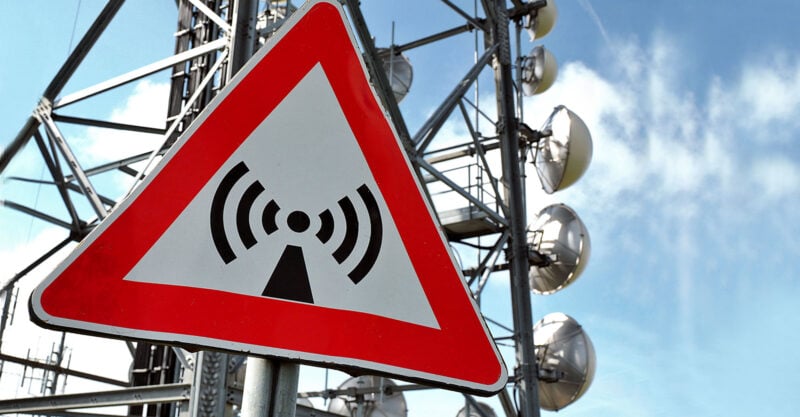Miss a day, miss a lot. Subscribe to The Defender's Top News of the Day. It's free.
The residents of two Massachusetts towns on Monday voted to put a hold on 5G cell tower projects until the Federal Communications Commission (FCC) completes a court-ordered review of the latest science related to the effect of radiofrequency (RF) radiation emissions on human health and the environment.
The residents in Sheffield and Great Barrington said they will consider all applications from telecommunications companies seeking to build wireless infrastructure in their town as “incomplete” until the FCC reviews “studies from scientists independent from industry” who have “fully investigated” the “safety” of 5G small cell technology and until the agency has “updated” its RF radiation regulations based on the review’s findings.
The citizens passed this warrant — listed as article 32 in Sheffield and article 38 in Great Barrington — at their annual town hall meeting.
In the warrant, the residents cited two separate rulings by the U.S. Court of Appeals for the District of Columbia Circuit that mandated the FCC conduct such a review and noted that the FCC has failed to comply with the court orders.
The District of Columbia Circuit in a 2019 ruling told the FCC it had to follow National Environmental Policy Act guidelines by conducting an environmental impact review for 5G small cell infrastructure projects.
The same court ruled in 2021 that the FCC had not adequately reviewed the scientific evidence regarding the safety of RF radiation and 5G for humans and the environment — and that it must do so.
By failing to comply with the two court orders, the FCC has failed to adequately show that 5G radiation is safe for the environment or humans, according to Cecelia Doucette, a technology safety educator and the director of Massachusetts for Safe Technology.
The agency needs to thoroughly examine the scientific evidence of harm and update its RF exposure guidelines, Doucette told The Defender.
“The harm from wireless radiation is happening right now,” she said. “It’s up to us as citizens to create the change and we are so inspired by the hard work the voters in Sheffield and Great Barrington have put in.”
She added:
“Every citizen should feel empowered to look at the science, work with their neighbors and towns, and put protections in place. It’s just common sense once you know the facts.
“Don’t wait for someone else to fix this for you, electropollution is too dangerous for us, our children and our pollinators.”
Nina Anderson, president of the Scientific Alliance for Education (S.A.F.E.) — a non-profit focused on “educating the public on health issues that may or may not be public knowledge” — called the vote “the first step in trying to protect our towns from intrusion by industry who has not complied with the court order and not proven this technology is safe.”
Children’s Health Defense (CHD) last month petitioned the FCC to “quit stalling” and comply with the District of Columbia Circuit’s 2021 order.
The order stemmed from CHD’s historic win in a case challenging the FCC’s decision not to review its 1996 health and safety guidelines for RF exposure.
The court in its 2021 ruling said, “The FCC completely failed to acknowledge, let alone respond to, comments concerning the impact of RF radiation on the environment … The record contains substantive evidence of potential environmental harms.”
Patricia Burke of Safe Tech International told The Defender:
“When citizens begin to look more deeply at the issues regarding wireless safety, including the conclusions that the Circuit Court reached in its 2021 ruling against the FCC, they realize that there is a problem.”
Burke said she was “so grateful to the sincere individuals who have been working behind the scenes in these towns and in others to facilitate conversations supporting necessary policy changes.”
Vote coincides with 1,000 days of Pittsfield residents’ battle with Verizon
The citizens of Sheffield and Great Barrington — both of which are agricultural communities — wanted “to be convinced that their crops will not suffer if the myriad of 5G transmitters negatively affect the bees,” according to a S.A.F.E press release.
The release stated:
“Their [the citizens’] warrant asks for input from scientists who are independent from the telecom industry who can give an unbiased report.
“The petitioners related telecom’s rollout of 5G without sufficient research as similar to big tobacco’s promotion of cigarettes. It was years later and many cancer deaths before regulations were enacted limiting smoking in public places and adding warning labels to packaging.”
Voters “spoke out” saying they wanted to know that a similar fate would not come to pass for those suffering from electro-hypersensitivity syndrome “with no recourse to remove the transmitters causing the problem,” the release added.
Monday’s vote coincided with residents of Pittsfield, Massachusetts, marking 1,000 days of being driven from their homes by a Verizon cell tower they allege made them sick.
The residents — who live in the “Shacktown” section of Pittsfield and are represented in court by lawyers supported by CHD — want Verizon to remove or relocate the tower and currently await a judge’s ruling on whether to allow their lawsuit to go forward or grant Verizon’s motion to dismiss the suit.





